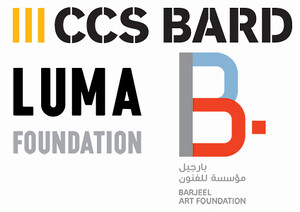June 24–December 15, 2017
June 24–October 29, 2017
33 Garden Road
Annandale-on-Hudson, New York 12504-5000
United States
T +1 845 758 7598
ccs@bard.edu
CCS Bard is pleased to present two new exhibitions, both opening on Saturday, June 24. In the Hessel Museum of Art will be Picture Industry curated by artist Walead Beshty, with works by over 80 artists, ranging from historical documents to major installations. Picture Industry complicates traditional accounts of photography, drawing from its role within science, the humanities and contemporary art. Encompassing a broad range of photographic practices from the late 19th century to the present, the exhibition reflects upon transformations in the production and distribution of photographic images as realized through its varied constructions of the corporeal, from its origin as scientific tool and a means of cultural investigation to its phenomenological effects on a viewer.
The wide variety of materials that constitute the exhibition (including collections of photographs, slide projections, periodicals, recent film and video installations, sculptures, and printed works on paper) create numerous situations within which to consider not only the materiality of images and the technologies that form their reception, but also the conflicted social history that lies under their surfaces and is inextricable from their origins. To this end, Picture Industry includes images and objects from a number of historical moments and social arenas arranged into a cohesive but varied array of historical positions, which often prefigure our complex contemporary image world.
Picture Industry features the work of: Thom Andersen, Lewis Baltz, Georges Bataille, Bernd and Hilla Becher, Ericka Beckman, Gretchen Bender, Lynda Benglis, Alphonse Bertillon, Black Audio Film Collective, Black Star Productions (Stewart Bird, Peter Gessner, René Lichtman and John Louis, Jr. in association with the League of Revolutionary Black Workers), Barbara Bloom, Duchenne de Boulogne, Sarah Charlesworth, Charles Darwin, Ariel Dorfman and Armand Mattelart, Stan Douglas, William Emory, Walker Evans, Harun Farocki, Morgan Fisher, LaToya Ruby Frazier, Lee Friedlander and Stuart Klipper, Ernst Friedrich, Francis Galton, Isa Genzken, Frank Gilbreth, Liz Glynn, Jack Goldstein, Dan Graham, Johan Grimonprez, James Hague et al., Lyle Ashton Harris, John Heartfield, Lewis Hine, Thomas Hirschhorn, Yngve Holen, Jenny Holzer, William Henry Jackson, Arthur Jafa, Fritz Kahn, Stephen Kaltenbach, Louise Lawler, Sherrie Levine, Glenn Ligon, Sharon Lockhart, Louis Lumière, Robert Mapplethorpe, Étienne-Jules Marey, Kerry James Marshall, Renzo Martens, Allan McCollum, Boris Mikhailov, Mitchell & Kenyon, Charles Moore, Jean-Luc Moulène, Eadweard Muybridge, Timothy O’Sullivan, Gordon Parks, Paul Pfeiffer, Jack Pierson, Seth Price, Jacob Riis, Martha Rosler, Cameron Rowland, August Sander, Allan Sekula, Stephen Shore, Hito Steyerl, William Henry Fox Talbot, Georges Gilles de la Tourette, Wolfgang Tillmans, Sojourner Truth, Cosey Fanni Tutti, Kelley Walker, Jeff Wall, Lawrence Weiner, and Christopher Williams.
This exhibition expands upon the original installation in summer 2016, which was part of Systematically Open? New Forms for Contemporary Image Production, the inaugural series of exhibitions at the LUMA Foundation’s Parc des Ateliers, Arles, France.
Picture Industry was commissioned and produced by the LUMA Foundation for the Parc des Ateliers in Arles, France.
Shown in the CCS Bard Galleries will be No to the Invasion: Breakdowns and Side Effects, curated by Fawz Kabra, with works drawn from the Barjeel Art Foundation, a collecting philanthropic institution based in the United Arab Emirates. The title of the exhibition is borrowed from a lino-cut print, that will also on view, by the Kuwaiti artist Thuraya Al-Baqsami. Featuring works dating from 1990 to 2016, the exhibition recalls various histories intersecting a shared geo-political space: the Arabic-speaking world. To begin in 1990 is to recall a socio-political landscape characterized by shifting regimes of power following Pan-Arabism, the Cold War, the Kuwait War, and the end of the Lebanese Civil War. The exhibition proposes an expanded meaning of the term invasion, one that goes beyond connotations of trespassing and violation to reflect a refusal or reckoning with interferences by agitators–the defense industry, media, global capital, or regional magnates. The artists in No to the Invasion parse the many intersecting influences of power that act on bodies, land, and production. Their works articulate ways in which bodies are subjected to various conditions of representation, control, and disaster to tell us about the limits of representation, the production of histories, and the transformation of landscapes. No to the Invasion considers the blind spots of these social and political histories, as well as their remnants, to look at a place whose representation is often overdetermined by master narratives. The accompanying publication includes contributions by Tarek El-Ariss, Marwa Arsanios, Kader Attia, Rawi Hage, Fawz Kabra, Thomas Keenan, Ahmad Makia, Khaled Malas and Sigil Collective, Mandy Merzaban, Sultan Sooud Al-Qassemi, and Ala Younis.
Exhibited artists include: Marwa Arsanios, Kader Attia, Lara Baladi, Yto Barrada, Taysir Batniji, Thuraya Al-Baqsami, Charbel-joseph H. Boutros, Ali Cherri, Khaldoun Chichakli, Fouad Elkoury, Mohssin Harraki, Khaled Jarrar, Lawrence Abu Hamdan, Mona Hatoum, Joana Hadjithomas and Khalil Joreige, Mohammed Kazem, Kareem Lotfy, Basim Magdy, Maha Maamoun, Jumana Manna, Sophia Al-Maria, Moataz Nasr, Farah Al Qasimi, Walid Raad, Sama Alshaibi, Ala Younis, and Akram Zaatari.
Also on view June 24–September 17, 2017 in the Collection Teaching Gallery will be No to the Invasion: From the Archive organized in collaboration with scholar Tarek El-Ariss, presenting a constellation of documents and audiovisual material. From the Archive considers the ways in which the body is a site of sedimentation and collapse, registering experience and telling stories that require deciphering and translation.
No to the Invasion was made possible with the generous support of the Barjeel Art Foundation, its founder Sultan Sooud Al-Qassemi, and the curatorial advice of Barjeel’s founding curator Mandy Merzaban.
The CCS Bard Galleries and Hessel Museum of Art at Bard College summer hours are Thursday through Monday from 11am to 6pm. All CCS Bard exhibitions and programs are free and open to the public.
Free chartered bus available from New York City for the openings on June 24. For reservations and information call T 845 758 7598, or write ccs [at] bard.edu. www.bard.edu/ccs.



